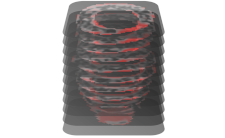Using AI to Dramatically Speed Up Cardiac Simulations – Published in Nature Computational Science
Several members of ADVANCE at Johns Hopkins, as well as collaborators at other institutions, have published DIMON (Diffeomorphic Mapping Operator Learning), an AI framework, in Nature Computational Science. This model accelerates the approximation of partial differential equations (PDEs) in complex engineering problems by thousands of times, enabling personal computers to perform tasks traditionally reserved for supercomputers.
DIMON was applied to over 1,000 heart “digital twins,” which are detailed computer models of individual patients’ hearts. The AI accurately predicted electrical signal propagation in each unique heart structure, significantly reducing computation time from several hours to approximately a few seconds on a personal computer. This advancement in AI could become the next-gen heart twins and holds promise for integrating personalized cardiac assessments into routine clinical workflows, potentially improving diagnostics and treatment plans for conditions like cardiac arrhythmia.
Beyond cardiology, DIMON’s versatility extends to various engineering applications, including aircraft shape optimization or crash testing, where it can model how shapes, forces, and materials interact and change. DIMON streamlines simulations, making design optimization more efficient across multiple scientific and engineering domains.
A publication of this study was recently accepted in Nature Computational Science and may be found at the following URL: https://www.nature.com/articles/s43588-024-00732-2
Johns Hopkins University issued a press release giving more detail on the work at the following URL: https://hub.jhu.edu/2024/12/09/trayanova-engineering-artificial-intelligence/

